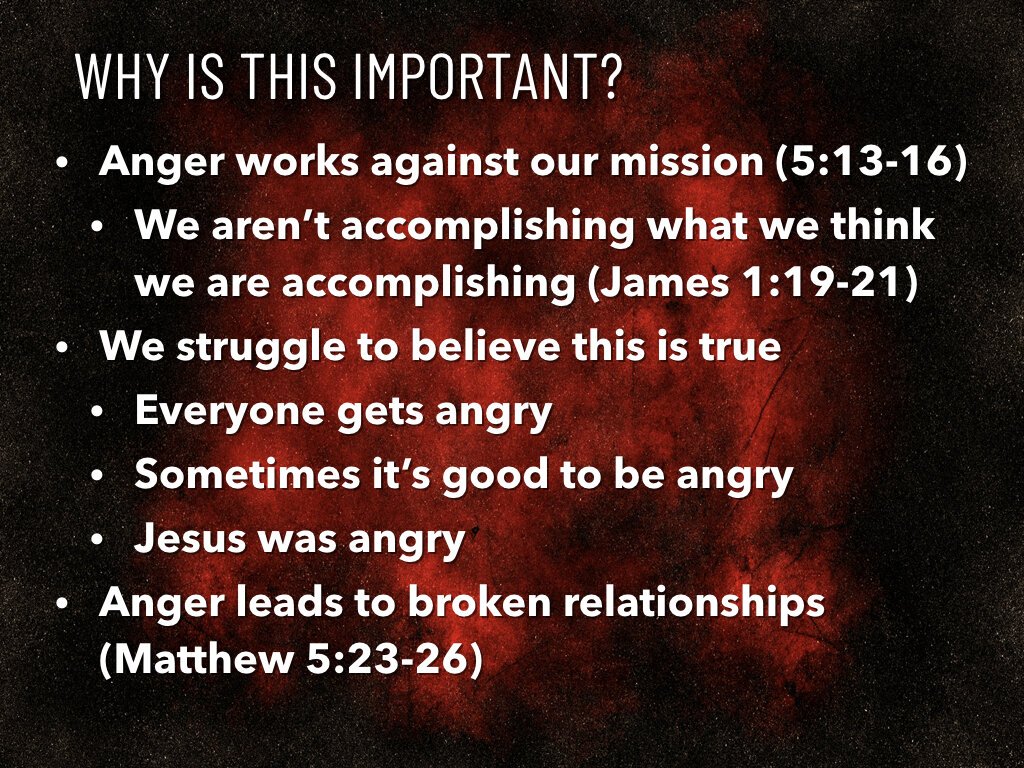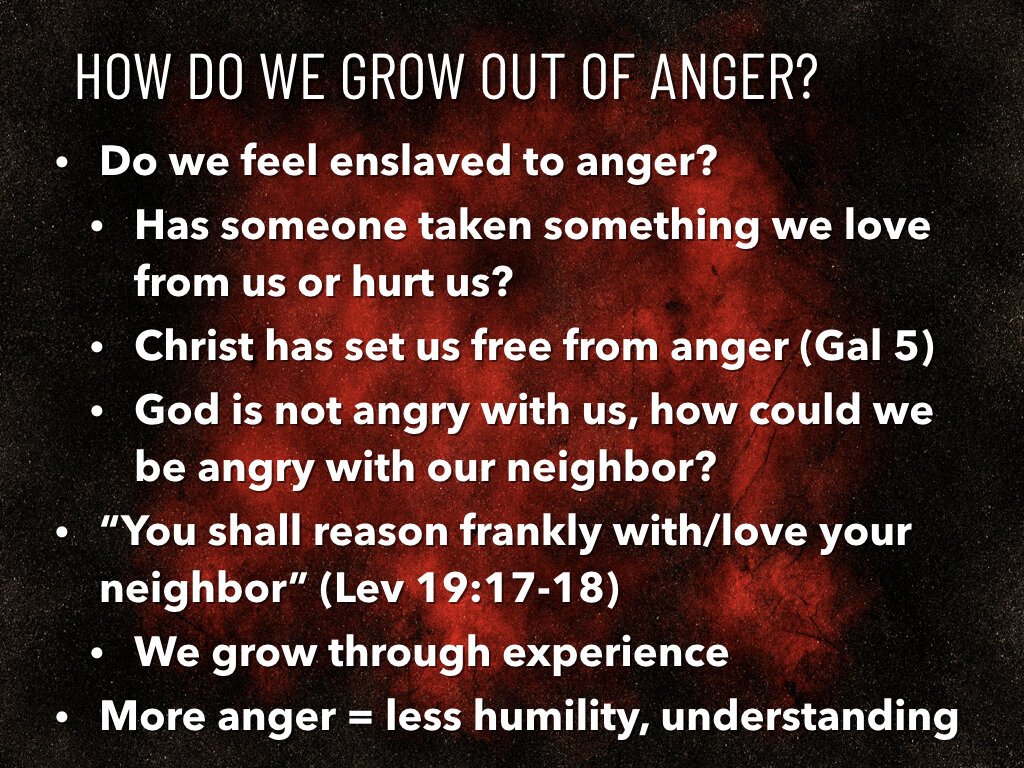Overcoming Anger (Matthew 5:21-26)
December 22, 2019
Last week we started to look at what people in the kingdom of heaven will do. How many commandments does God expect his people to keep? The answer is all of them. But he doesn’t want us to keep the commandments the way the Jews have always “kept” the commandments. Throughout the Old Testament, the people would go through periods of spirituality and periods of obedience under the leadership of men like Moses, Joshua, David, and Hezekiah. But there are also periods of extreme rebellion that we read about. In the prophets, there are continual problems that God points out to the people. These problems are not apparent to the people. They believe that they are worshipping God and that these prophets from God are telling lies. They were offended when the prophet said they were wrong. Listen to what the people of Israel said against Jeremiah.
Jeremiah 18:18 (ESV) --- 18 Then they said, “Come, let us make plots against Jeremiah, for the law shall not perish from the priest, nor counsel from the wise, nor the word from the prophet. Come, let us strike him with the tongue, and let us not pay attention to any of his words.”
One thing that is interesting about the people’s rebellion in the time of Jeremiah is that they thought they were righteous. They were only 20 years removed from one of the greatest kings, Josiah. Surely they were right in their worship. They worshipped idols in addition to YHWY, but God was okay with that. They had prophets that said that was okay. But Jeremiah says something that agrees with the law, and they want to defame him. A short time later, these people tried to kill Jeremiah when he said that the temple would be destroyed and that they needed to submit to Babylon. They were willing to murder God’s prophet, and if they had succeeded, they would go to the temple and worship God the next day. How delusional do you have to be?
How did they get so far away from what God wanted them to be? God said through Isaiah, “They worship me with their lips, but their hearts are far from me.” God always desires a heart that loves him more than this world and more than self. But notice here that outward obedience does not make up for us straying from God with our heart. Ultimately, that will end with outward disobedience. This is why God holds his people to a standard that is not outward but inward. What we do in the external is essential, but it should be the outgrowth of a heart that has been transformed to be like God. If the outside of the cup looks clean and the inside is a mess, there is a real problem that needs to be addressed. This is such an important principle to learn and to teach our children. In the next few sermons, Jesus will help us understand this internal standard so that we can find help for some major internal flaws in our character.
Matthew 5:21 (ESV) --- 21 “You have heard that it was said to those of old, ‘You shall not murder; and whoever murders will be liable to judgment.’
“You Have Heard”
The first thing I want to notice is that Jesus refers to a teaching that the people have probably heard all their lives and understood. The wording here shows that Jesus wants to evaluate the teaching of the Pharisees and scribes on the law. The Pharisees and scribes have taken the commandment, “You shall not murder,” and added, “Whoever murders will be liable to judgment.” There is nothing untrue about this. Under the law, the punishment for murder is capital punishment. The one who murders will be put to death.
Matthew 5:22 (ESV) --- 22 But I say to you that everyone who is angry with his brother will be liable to judgment; whoever insults his brother will be liable to the council; and whoever says, ‘You fool!’ will be liable to the hell of fire.
“But I Say To You”
Jesus takes that command and that way of looking at the law and the prophets, and he sees something wrong with it. One can obey this law to not murder and still fail to keep the command of Leviticus 19.
Leviticus 19:17--18 (ESV) --- 17 “You shall not hate your brother in your heart, but you shall reason frankly with your neighbor, lest you incur sin because of him. 18 You shall not take vengeance or bear a grudge against the sons of your own people, but you shall love your neighbor as yourself: I am the Lord.”
Many people think that Jesus is adding to the law of the Old Testament, but Jesus is calling for man to pay closer attention to the word of God. Man has this tendency to measure sin and to say that one sin is so much worse than another. Therefore, I can do a smaller sin and be okay. But Jesus says that the lesser sin is just as important as the bigger sin. We cannot overlook the command to love our neighbor and then justify ourselves because “It’s not like we killed anyone.” That’s not the point! God has always wanted man to consider the other person with love and to reason with one another openly so that we can work together to glorify God.
Why does Jesus want us to stop being angry?
Anger works against our mission.
I kind of like being angry. Sometimes being angry is the only way I can get anything done. But anger and hatred keep us from bringing glory to God. This is the same thing that James said in James 1:19-21.
James 1:19--21 (ESV) --- 19 Know this, my beloved brothers: let every person be quick to hear, slow to speak, slow to anger; 20 for the anger of man does not produce the righteousness of God. 21 Therefore put away all filthiness and rampant wickedness and receive with meekness the implanted word, which can save your souls.
The thoughts that come into our mind when we are angry will not produce the righteousness of God. This is not what the salt and light of the world does. Instead of speaking in anger against someone, Jesus commands us to get control of our emotions and resist the temptation to insult someone around us. But hear what he says about this. He says that the one who is angry or insults his brother, “Is liable to judgment,” “Is liable to the council,” and “Is liable to the hell of fire.”
We struggle to believe this is true
Some people see anger as something that they struggle with constantly. Maybe it is in our DNA, or perhaps we are trained to respond with rage by our environments. Regardless, some of us are defensive, and we struggle to control our emotions. Things do not go our way, so we lash out with insults, or we say and do things that are intended to harm the person who offended us. Some of us lash out, punishing people with silence and rejection. The things that we say or do in anger hurt people. We don’t realize it, but we are tearing down the confidence that people have in themselves, in us, and in God. We are often causing other people to sin. God is not okay with our unrighteous anger. However, it reveals itself. He says that the angry one is sinning. If we are okay with our anger, justifying the attacks on others, we are rebelling against God’s word. That’s a severe offense.
I know what we will say in response to this, “Sometimes it is good to be angry.” I have said this to myself countless times. Anger is a natural human emotion, but God has shown us that he does not hold a grudge against us. He seeks to justify us and forgive us, not to harm us and punish us for our sin. Even if Jesus had righteous anger, do we trust that we will be able to control ourselves to the extent that Jesus did? Look at Moses, who struck the rock in anger at the people. He did so many wonderful things and had great faith in God, but one act in “righteous anger” cost him the promised land. As children of God, we want to remove anger from our lives.
Anger leads to broken relationships
Matthew 5:23--26 (ESV) --- 23 So if you are offering your gift at the altar and there remember that your brother has something against you, 24 leave your gift there before the altar and go. First be reconciled to your brother, and then come and offer your gift. 25 Come to terms quickly with your accuser while you are going with him to court, lest your accuser hand you over to the judge, and the judge to the guard, and you be put in prison. 26 Truly, I say to you, you will never get out until you have paid the last penny.
Now, Jesus does something amazing here. He switches to a scenario where someone has come to worship God and provide an offering. In this case, the worshipper has a broken relationship with someone. He has sinned against them by hating him in his heart, acting vengefully, or holding a grudge. What must he do? He must go and be reconciled before he offers his gift. Do we see the significance here? We are not worthy of worshipping our God if we have anger and hatred in our hearts. God does not want our sacrifices because we are not approaching his throne with a pure heart. Our heart is tainted by the hatred we feel toward a brother. Jesus does not just say forgive them. He commands us to go to them and be reconciled with them.
How Do We Grow Out Of Anger?
Maybe there is someone who hears all of this and struggles to see a way out of anger. They get angry all the time with their friends or with their family. How can we grow out of anger? How can we overcome these emotions that boil up so quickly? When we feel the rage building up inside of us, we need to let it go. We cannot keep a reservoir of anger inside of us and be pleasing to God. Nothing is stopping us from forgiving and getting over whatever it is that makes us angry, but ourselves. Don’t tell yourself you can’t. Don’t say, “You don’t know what they have done against me.” I know I don’t know, but God does. We can’t let the evil of those around us provoke us to be evil. We don’t have to vent our anger on anyone else. We don’t have to bottle it up and hold a grudge or feel animosity toward anyone. The truth is that we are choosing to feel that way. Our feelings are under our control. Don’t believe the lie that we have no control over our emotions. Jesus has given us what we need to be self-controlled. We are not bound to sin like we used to be. We pray to God now, and he hears us. Remember how he has loved us when we were complete fools, and remember how he let us go without punishment. Let your neighbor go without punishment. Say, “Father forgive them, as you have forgiven me.”
Leviticus 19:17 also says, “You shall reason frankly with your neighbor.” If our neighbor has something against us, or if we have something against our neighbor, we can talk about it with love in our hearts. That ought to be the goal. We know from all the angry outbursts in the past that getting angry will not help the situation. It only makes the person we are mad with more distant. It only takes away the love in their hearts for us. Don’t believe the lies. Anger is poison, not medicine.
Marriage and children have been some of the most educational experiences for me. There is nothing like joining your life to someone who you think you know everything about and finding out that they are different than you expected. In the first few years of marriage, I remember acting like a crazy person, and I remember thinking that Jenna was crazy. Anger makes us look this way. It is best described as temporary insanity.
Why did we get so angry in our first few years of marriage? We had all of these expectations that went unmet. We assumed that our spouse is going to be just like our mother or father, and we assume that the person we dated is going to be the person we marry. But no one can maintain the facade in the long run. We have to be real with each other, and we have to learn to overcome the bad habits that we didn’t even know that we had. We also have to learn to show grace and patience in a way that we have only experienced from God. Marriage is unique because we are tied together, and we have to work it out or life will be miserable. We can’t just leave.
Having children is like getting a Master’s degree in overcoming anger. There is nothing like trying to convince a two-year-old that they must submit to your authority. The temper tantrum of a two-year-old is a perfect model of what we do when we are angry. They have their tantrums, and then we have ours. They will push us to the edge of insanity if we let them. But we do not have to let them make us temporarily insane. We must realize that we have lost sight of loving our wife or our child when we get angry. We are now attacking them to make ourselves feel better. That is selfish. That is sin.
Outbursts of anger are attempts to make us feel better at the expense of someone else. God does not do this, and he expects us to abstain from this behavior. We are not superior to our neighbors, so we must not act like we are. When we understand how much we have messed up and how much God has forgiven us, that is supposed to humble us. That should stop us from thinking that they are fools, or assuming that we know better than them. We have to be poor in spirit and meek. Anger is neither.
We are given a superior role with our children, but we have to discipline as God disciplines us, with love and wisdom. Their rebellion is at least partially our fault for not disciplining and instructing them consistently. I should be angry at myself, not my child, who is just using the manipulation I have let him get away with. After we mourn over our sins of anger, let’s become peacemakers who reason with each other frankly and maintain a heart full of love.
Conclusion
Those in the kingdom of heaven must exceed the righteousness of the scribes and Pharisees. How? By overcoming their anger. God has given us every reason to do this. He has shown us 1. It is for our good. 2. We are forgiven and blessed beyond what we deserve. 3. This is how we understand God’s patience with us.
Have you experienced this love? Do you know what it is like to have your heart transformed? You can find rest from the guilt your acts of anger bring. God does not want to condemn anyone in this room. He loves, heals, and forgives those who are poor in spirit and willing to submit to his Son, Jesus. Is that you?





